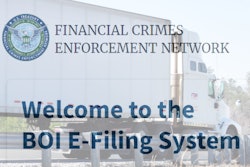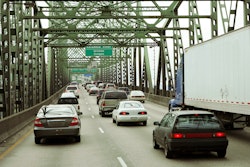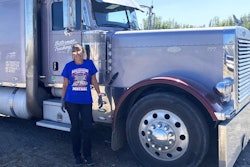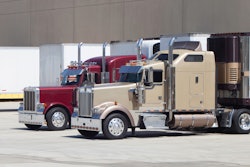A recent report from load board Truckstop shows freight fraud of all types has jumped 130% in 2023, from 945 reports in 2022 to 2,178 in 2023.
Those numbers reflect reports from Truckstop's users, and also all incidents reported to Truckstop's internal Assurance Department, according to Brent Hutto, the chief relationship officer at Truckstop.
So while those numbers certainly don't capture all the rampant double-brokering and other freight fraud in trucking, they do track with other trends, like the nearly tenfold increase in cargo thefts that currently haunts warehouse docks and dark parking spots -- load boards and email inboxes, too.
Truckstop sorts freight fraud into five broad categories. Keep in mind that double brokering isn't that neatly defined, and many owner-operators might say the top two categories here offer different flavors of the same offense.
- Unauthorized re-brokering of shipments: Carriers that take a load from a legitimate broker and give the load to another carrier or broker to take the load.
- Double brokering: Brokers that take a load from another broker or carrier and give it to another carrier when the original broker did not know or approve of the move.
- Fraudulent activity: Carrier or broker doing something illegal that is not categorized in other buckets listed. One example: Shipping illegal goods.
- Stolen loads: Carriers that take a load and do not deliver goods to the shipper (may or may not be recovered).
- Holding load hostage: Carrier that takes a load and illegally refuses to deliver load until a higher payment is made or get money upfront.
The infographic below provides a neat breakdown of how much freight fraud is rising, and that a whopping 69% appears double broker-related.
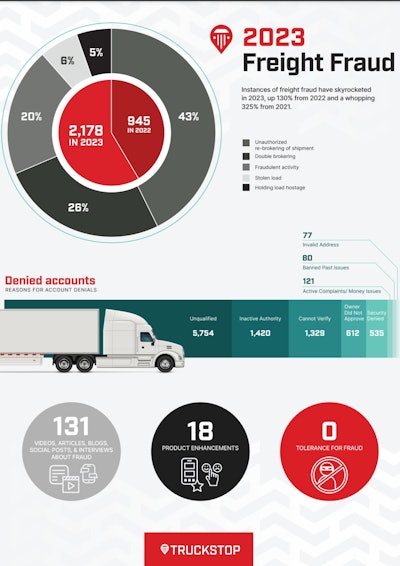
What load boards, truckers can do about the fraud problem
Truckstop didn't just share the stats to alarm users. "At Truckstop, we're not just watching -- we're taking action," the company wrote trumpeting "a whopping 9,928 blocked accounts last year!"

Hutto attributed the rise in fraud to a fragmented, trillion-plus-dollar transportation industry, abundant platforms and opportunity for cyber crime, and a down market.
"When the markets get hard, it's less profitable for carriers and the bad actors really prey on that," he said. "When things get a little more difficult, people don’t pay attention to the details."
All of this, perhaps unsurprisingly, is unfairly tilted against owner-ops and small carriers.
"All the best freight moves in 60 seconds or less in the spot market," said Hutto. "The panic or the urgency makes you not prove it as much."
Imagine getting an email blast from a shipper promising to pay $3,000 on a lane that's in your backyard and normally pays $2,000 or less. How fast would you smash the reply button? Would you notice a small detail off in the email address or shipper logo? Would you have time to call people to validate the rate and load before you felt the need to act?
After all, good paying spot gigs do come up, but often that's just the Trojan horse double brokers and fraudsters ride in on.
According to Hutto, Truckstop's built in new protocols like multi-factor authentication, now an industry standard, to help weed out a lot of bad actors and protect owner-operators and small carriers (brokers, too) on the platform. The company's gone a step further, too.
Late last year, Truckstop implemented a photo verification system, using AI tools to compare selfies submitted to the app with IDs.
"Identity verification compares an individual’s government-issued ID with a real-time photograph," according to the Truckstop website. Carriers involved in Truckstop's carrier vetting program, RMIS, "are required to undergo this process annually or if their government-issued ID expires."
[Related: Truckstop enhances security in RMIS broker-contract system, trucking conditions update, more]
According to Hutto, the company prides itself "in being the leader in saying, 'Sorry, you can't use our system,'" to shady actors. That's what's behind the nearly 10,000 accounts blocked last year.
"We’re keeping the Russians out, we're keeping. out all the bad actors in China -- it’s relentless," said Hutto, referencing known international hot spots for cyber crime. Truckstop uses AI and industry-leading tech to weed out easily spotted inconsistencies that could be an indicator of fraud, such as carriers using improper addresses that Overdrive uncovered in the 'WTFFMCSA' investigation last year.
"It's a giant responsibility on our end, but we ping data against FMCSA to purify information," said Hutto.
That responsibility extends even beyond loads posted on the board, he said. Carriers know that shippers and brokers often go off-platform, directly emailing carriers before posting on the load board. Most of the time, he wagered, fraud happens off-platform, with crooks impersonating brokers or shippers a carrier might have initially contacted on a load board.
In those cases, Hutto said Truckstop still wants to get involved and help. The company encourages carriers to report all instances of fraud to Truckstop and to the FBI, whether or not it took place on-platform. even posting this story about how to partner with the FBI against freight fraud.
How about the other major load board, DAT? A spokesperson from that company touted their recent hire of Dr. Erika Voss as VP of information security, leading a recent bolstering of security protocols. This includes using AI and machine learning to study load board behavior and "assess the risk of individual accounts based on millions of login events."
[Related: Inside the explosion of 'cyber crime' in brokered-freight networks]
DAT noted "we can detect signs of identity-related fraud, including bots, duplicate accounts, fake accounts, impersonations, and devices that don’t match your past behavior."
Like Truckstop's Assurance Department, DAT has a Network Integrity Unit that "is responsible for compliance reviews and working with law enforcement and industry partners," the company added. That unit "manually verifies every new broker account on DAT One. ... You can’t post a load without undergoing a compliance review. A reminder: Only licensed and bonded freight brokers can post loads."
That, plus an "industry working group" on freight fraud, a partnership with CarrierWatch, and some pending AI tools to make sure carriers' information matches what's filed with FMCSA and that carriers are assigned an AI-generated risk score, represents the bulk of DAT's multi-pronged approach to skewering freight fraud.
But even with all the flurry of activity from Truckstop and DAT, is a little AI going to stop freight fraud?
No, admitted Hutto, but neither will they stop trying. "Yes we’ve had some fraud but we’ve had much much less than anyone else in our segment. We work hard for that, we've got to protect the carrier, because if we don't do that, we don't have a business and America suffers."
[Related: The double-brokering slow burn: How it happens, and how to fight back against it]

